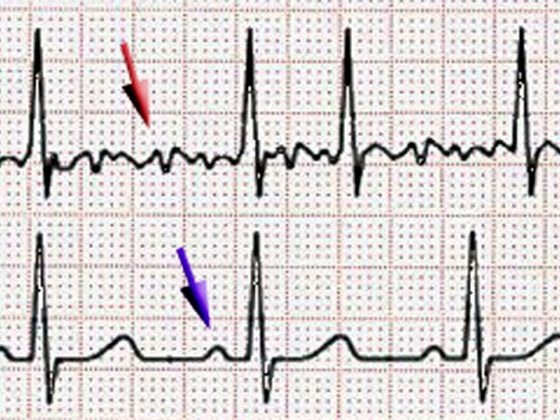At the EHA Congress in Milan, experts discussed treatment options for patients with acute myeloid leukemia. Elderly patients in particular continue to have a poor prognosis under intensive chemotherapy. Allogeneic stem cell transplantation is also considered here only in selected cases. What remains is palliative chemotherapy. What successes can we expect here?
Acute myeloid leukemia (AML) is a subtype of leukemia that starts in the bone marrow and quickly spreads to the blood and other parts of the body. Different forms of AML can be distinguished, depending on the stage of maturity of the cancer cells at the time of diagnosis and the difference compared to normal cells. AML is primarily a disease of old age and occurs somewhat more frequently in men. The pathogenesis is largely unclear. Often, DNA mutations are found in AML cells, which could have been caused by radiation or chemical substances, among other things. Possible risk factors are therefore:
- Exposure to radiation
- Previous treatment with chemotherapy or radiotherapy
- Previous treatment for childhood acute lymphoblastic leukemia
- Smoking, especially after the age of 60.
- A previous blood disorder such as myelodysplastic syndromes
- Certain genetic disorders such as Down syndrome, Fanconi anemia, Shwachman syndrome, and Diamond-Blackfan syndrome.
There are two major therapeutic approaches used for AML: chemotherapy and stem cell/bone marrow transplantation. 2013 marked the 40th birthday of the so-called 3+7 regimen: cytarabine and an anthracycline in induction therapy. “On days 1-3, daunorubicin, for example, is given at the standard dose of 45 mg/m2; on days 1-7, cytarabine, for example, is given as 100 mg/m2 administered. Few therapeutic approaches to malignancies have remained as constant as this one. The longevity is grounded in the constellation of genetic patterns in AML, which may explain the lack of success of many new approaches. So are the current controlled randomized trials convincing enough to change the status quo?” was the question posed by Prof. Adriano Venditti, MD, Rome, at the EHA Congress in Milan.
Induction therapy, which is designed to destroy all leukemia cells in the bone marrow and blood, is followed by post-remission therapy to prevent relapse. This is crucial for disease-free long-term survival.
What to do in elderly patients?
Often, the boundary between “older” and “younger” patients with AML is set at 60 years of age. Intensive chemotherapy shows a significantly better prognosis in younger patients than in older ones: This is mainly due to certain risk characteristics of this latter population. For example, a higher prevalence of prognostically unfavorable cytogenetic constellations or the overexpression of genes causing drug resistance is found here. Furthermore, comorbidities and anticipated toxicities may be contraindications to intensive chemotherapy. Allogeneic stem cell transplantation is also associated with increased mortality and morbidity in elderly patients. It is therefore only considered for selected, few individuals from this population. Ultimately, age itself remains an independent prognostic factor in AML.
Therefore, as palliative chemotherapy for elderly patients with low proliferating AML (bone marrow blasts ≤30%), agents such as azacitidine were investigated. This offered a good benefit in terms of overall survival given the less than satisfactory results of other therapies [1] and soon became the standard of care for non-intensively treatable elderly individuals with AML, 20-30% bone marrow blasts, and multilineage dysplasia. Whether the administration of azacitidine is also effective in older AML patients with more than 30% bone marrow blasts or shows an additional effect in combination with intensive chemotherapy is currently being investigated.
One of these multicenter, randomized phase III trials was also presented at the EHA Congress: the AML-001 [2]. She investigated the effect of azacitidine compared with conventional regimens in patients with newly diagnosed de novo or secondary AML (>30% bone marrow blasts). Participants were older than 65 years and not eligible for allogeneic stem cell transplantation. Prior to randomization, the 488 patients were each assigned to one of three conventional regimens (choice of individual best therapy): intensive chemotherapy (3+7), low-dose cytarabine, or best supportive care (BSC). They were then randomized to receive
Group 1 (n=241): Azacitidine (75 mg/m2/tgl, subcutaneously for seven days in each 28-day cycle).
Group 2 (n=247): the previously selected conventional regimen (45 received BSC, 158 low-dose cytarabine, and 44 the intensive chemotherapy).
Results: The primary endpoint was overall survival, which was a median of 10.4 months in group 1 and 6.5 months in group 2 (p=0..829). Accordingly, while this point did not reach statistical significance, a prespecified sensitivity analysis for overall survival showed a significant benefit: 12.1 vs. 6.9 months (p=0.019). The 1-year survival was 47 vs. 34% for azacitidine resp. for conventional regimes.
These are the best overall and 1-year survival data observed to date with low-intensity therapy for elderly AML patients, according to principal investigator Hervé Dombret, MD, Paris. Grade 3 and 4 hematologic adverse events occurred more frequently with azacitidine than with BSC and equally frequently than with the other two conventional regimens.
Source: EHA Congress 2014, June 12-15, 2014, Milan
Literature:
- Fenaux P, et al: Azacitidine prolongs overall survival compared with conventional care regimens in elderly patients with low bone marrow blast count acute myeloid leukemia. J Clin Oncol 2010 Feb 1; 28(4): 562-569.
- Dombret H, et al: Results of a phase 3, multicenter, randomized, open-label study of azacitidine (aza) vs conventional care regimens (ccr) in older patients with newly diagnosed acute myeloid leukemia (aml). EHA 2014 #Abstract LB2433.
CONGRESS SPECIAL 2014; 44-46











